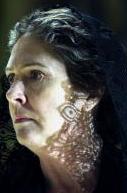SEARCH CurtainUp
REVIEWS
FEATURES
NEWS
Etcetera and
Short Term Listings
LISTINGS
Broadway
Off-Broadway
BOOKS and CDs
OTHER PLACES
Berkshires
London
LA/San Diego
DC
Philadelphia
Elsewhere
QUOTES
On TKTS
LETTERS TO EDITOR
FILM
LINKS
MISCELANEOUS
Free Updates
Masthead
NYC Weather
 London Review
London Review
The House of Bernarda Alba
by Charlotte Loveridge
|
We are rotten with the terror of what someone might say
--- Magdalena |

Penelope Wilton as Bernarda Alba
(Photo: Catherine Ashmore) |
It is therefore entirely fitting that, given the play's basis in reality, Howard Davies' moving production should so effectively present Lorca's characters as naturalistically as possible. Neutralising the play's otherness makes the audience feel closer to the imprisoned daughters, grants them greater sympathy and makes the final tragedy all the more chilling.
Vicki Mortimer's design has been criticised for deviating from the monochrome starkness of the original stage directions. Indeed, the set is visually sumptuous, full of the softened earthy colours and gentle Mediterranean-sun lighting we would associate with a Spanish villa. Tall, parallel arches frame the spacious room and their grandness is topped by a slight hint of decay: the curved stained glass windows have broken edges. Whilst Lorca's conception of the house's black and white interior clearly mirrored the theme of imprisonment, this production's sense of stifling claustrophobia relies upon the play's content. In fact, Bernarda's five daughters, trapped by their mother's tyranny inside and the community's traditional narrow-mindedness without, seem all the more cruelly and unnaturally confined in these potentially idyllic surroundings.
Penelope Wilton, the "empress of all she surveys", plays a more human Bernarda than is often portrayed. This successfully makes her seem more convincingly real while her intolerant, inflexible tyranny is uncompromised. Bernarda may have all the character qualities of forceful Greek tragic heroines like Clytemnestra or Medea, but she is also terrifyingly similar to us. This production particularly emphasizes Bernarda's peripeteia, or "reversal of intention", whereby her obsessive concern with reputation and honour cause her familial despotism which in turn brings about the very calamity she was so anxious to avoid. Penelope Wilton's masterly, versatile performance ranges from Bernarda's menacingly violent displays of authority to her salacious enjoyment of village scandal. A particularly excruciating moment is when Bernarda, having dismissed Poncia's (Deborah Findlay) wise cautionary advice, smugly dances offstage with very slight movements while the audience is aware of the inevitably impending catastrophe.
Her daughters are individually excellent as their characters portray differing responses to the same maternal tyranny. Magadalena (Justine Mitchell) is more resigned to her permanent imprisonment, Amelia (Katherine Manners) is more naive and Martirio is more tormented by her desire for, yet exclusion from, men. Angustias (Sandy McDade) is an outsider, resented by the others because of her imminent marriage, in a performance which manages to evoke pathos for this rather ridiculous character. The youngest, most spirited sister Adela is played admirably by Sally Hawkins, especially in the scene when she writhes in empathetic pain for an unmarried village girl who gave birth and is viciously hunted down. Maria Josefa (Cherry Morris) plays Barnarda's senile mother with agonisingly tragic-comic flair. Her demented but also extremely pertinent ramblings lucidly reveal the situation of women without men in 1930s rural Spain. Deborah Findlay is Poncia, the pragmatic, insightful but ultimately powerless housekeeper. She shows how, in spite of the prevailing pressure of intolerant social values, there is still an alternative to Bernarda's ruthlessness.
David Hare's translation gives a good sense of the original's vitality and, like the production as a whole, veils its stylised symbolic resonance beneath apparent naturalism. Lorca's last play was written when Spain was on the verge of civil war. Exactly two months after he completed The House of Bernarda Alba, Lorca was killed by right-wing activists because of his high-profile socialist sympathies and homosexuality. Howard Davies' production brings out the play's prophetic significance. The constantly tolling bells are replaced by the sound of airplanes overhead, unmistakably signally the onset of one of the most bloody, savage episodes of modern European history. Although Bernarda's household is realistic in itself, it also possesses allegorical importance for the whole of Spain. Adela's death, caused by the denial of human passion and freedom, becomes analogous for Lorca's own tragic end and an indication of the oppressive policies of Franco's regime. Howard Davies competently engages with the larger, political issues by portraying this mirror in microcosm, reflecting the country as a whole by a single domestic picture.
LINKS TO REVIEWS OF OTHER PRODUCTIONS OF THE PLAY
The House of Bernarda Alba in Los Angeles
The House of Bernarda Alba Chay Yew adaptation
The House of Bernarda Alba from Off-Broadway Prospect Theater
| The House of Bernarda Alba
Written by Frederic Garcia Lorca In a new English version by David Hare Directed by Howard Davies Starring: Penelope Wilton, Deborah Findlay, Sandy McDade With: Justine Mitchell, Katherine Manners, Jo McInnes, Sally Hawkins, Cherry Morris, Pamela Merrick, Jennifer Scott-Malden, Sophie Trott, Rachael Spence, Kirsty Wood, Beth Fitzgerald, Maria Colledge, Jennifer Hill, Mary Cunningham Design: Vicki Mortimer Lighting: Paule Constable Sound: Paul Groothuis Music: Dominic Muldowney Running time: Two hours 45 minutes with two intervals Box Office: 0207 452 3000 Booking to 30th April 2005. Reviewed by Charlotte Loveridge based on 15th March 2005 performance at the Lyttelton, National Theatre, South Bank, London SE1 (Rail/Tube: Waterloo) |


Mendes at the Donmar
Our Review

Peter Ackroyd's History of London: The Biography

London Sketchbook

Retold by Tina Packer of Shakespeare & Co. Click image to buy.
Our Review

6, 500 Comparative Phrases including 800 Shakespearean Metaphors by CurtainUp's editor.
Click image to buy.
Go here for details and larger image.
